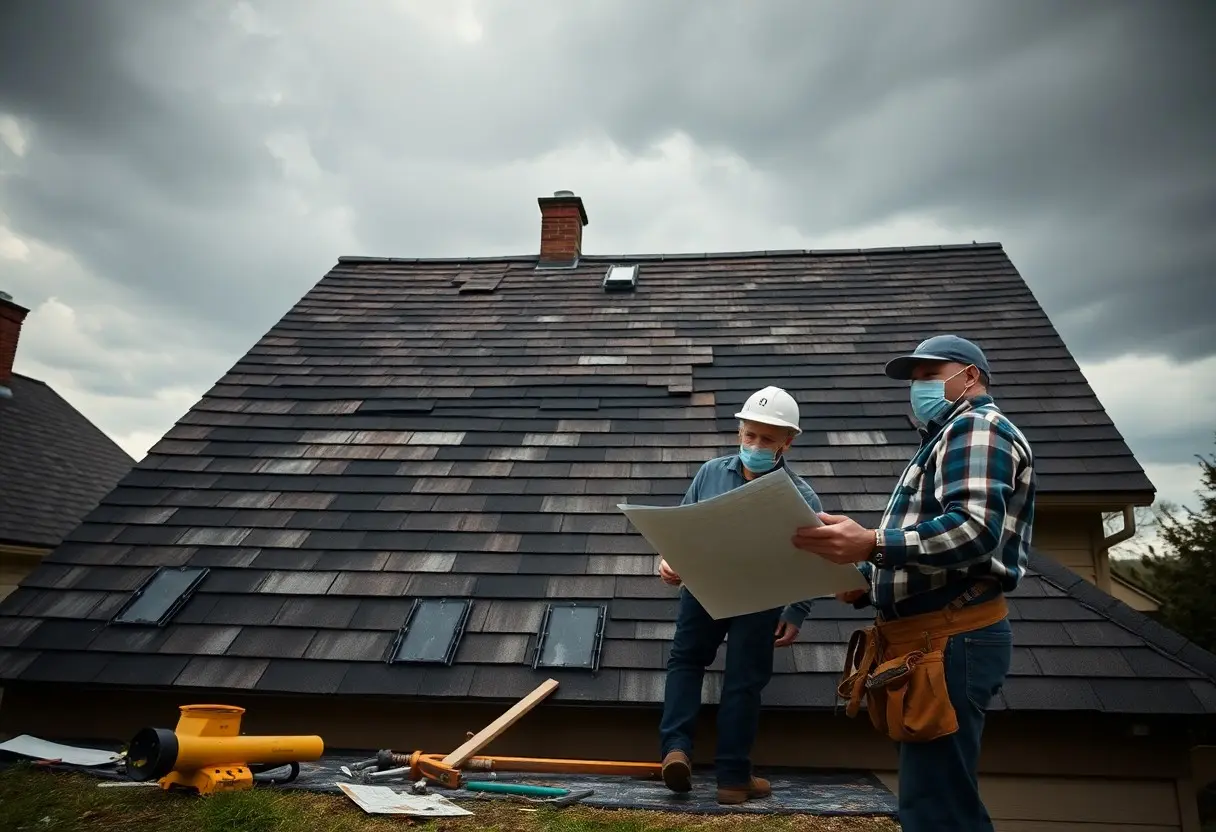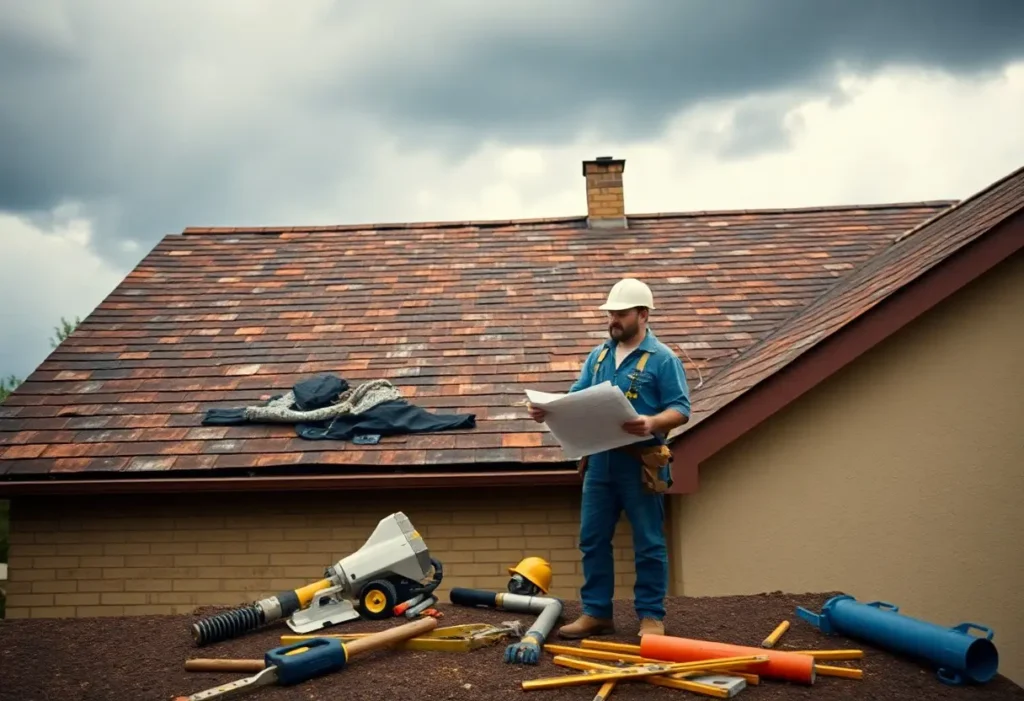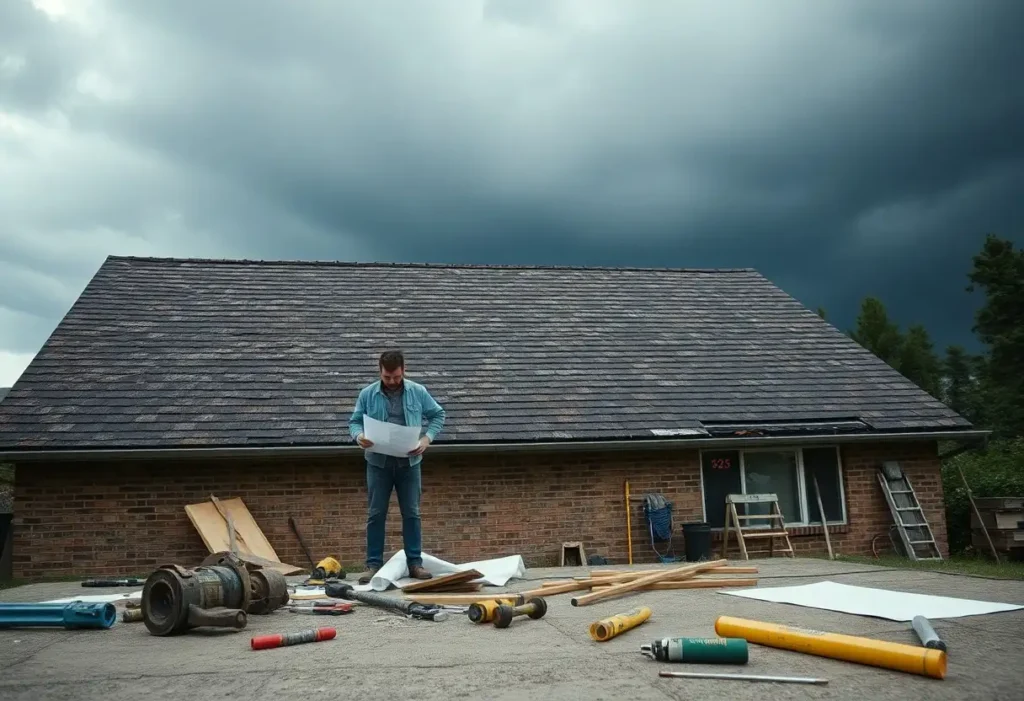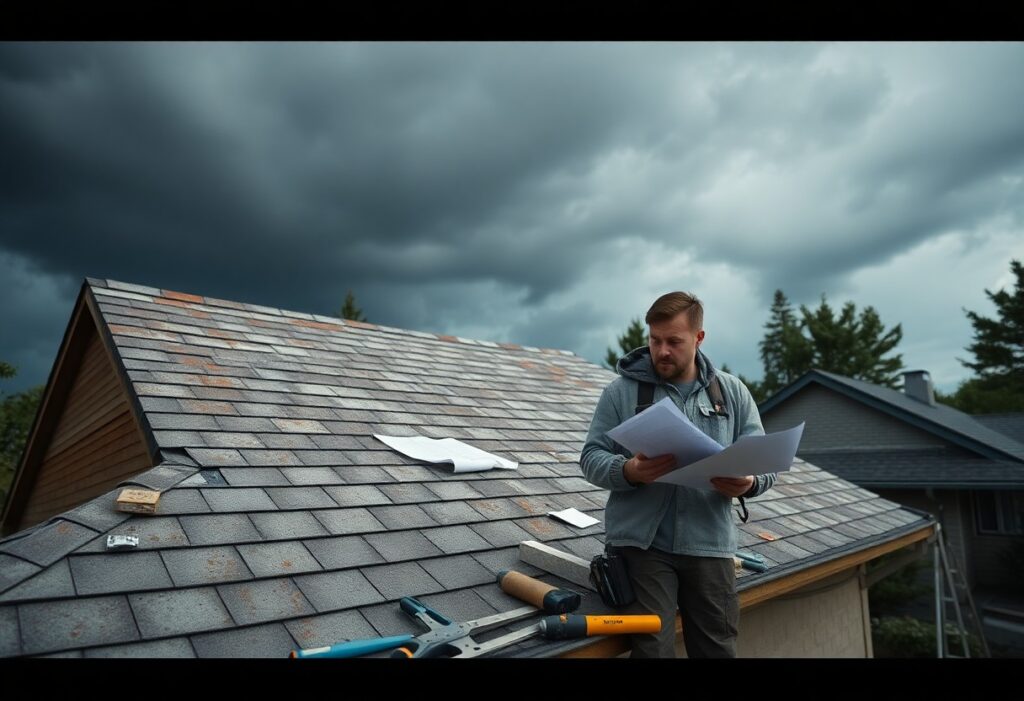5 Warning Signs You Hired A Bad Roofing Contractor

Warning! If you suspect you’ve hired a bad roofing contractor, it’s crucial to recognize the warning signs that could lead to serious headaches down the line. From unlicensed workers to failure to provide a clear timeline, these red flags can jeopardize the integrity of your roof and, ultimately, your home.
In this post, you’ll learn about the five most significant indicators that your choice may not have been the best, helping you make informed decisions for your roofing needs.
Key Takeaways:
- Incomplete or unclear contracts may indicate a lack of professionalism in the contractor’s approach.
- Consistently poor communication can lead to misunderstandings and delays in the roofing project.
- Check for proper licensing and insurance; lacking these could pose significant risks for your property and liability.
- Unrealistically low estimates may suggest that the contractor is cutting corners or lacks experience.
- Poor reviews or a lack of references may indicate issues with past projects and customer satisfaction.
Red Flags in Communication: Is Your Contractor Ignoring You?
Lack of Clear Responses
If your contractor struggles to provide you with clear and direct answers, consider this a significant warning sign. Communication should flow seamlessly, allowing you to understand project timelines, costs, and procedures without confusion. When requests for information are met with vague responses or unnecessary delays, it indicates a lack of transparency in their work ethic. Strong contractors prioritize clear dialogue, ensuring you’re informed every step of the way.
Suppose you’re repeatedly met with indecisiveness or vague answers regarding your roofing project. In that case, you might be dealing with someone who lacks experience or confidence. It’s worth noting that a reputable contractor will not only respond promptly but also do so with a level of detail that leaves no room for misunderstanding.
Unprofessional Behavior and Attitudes
Witnessing unprofessional behavior from your roofing contractor can undermine trust and project integrity. This may manifest as rudeness in communication, a dismissive attitude towards your questions, or general disorganization, like missing scheduled appointments. Professionalism extends beyond technical skills; it encompasses respect, reliability, and open communication. When these elements are missing, you should question whether your contractor values your business and is committed to delivering quality work.
Another aspect of unprofessional behavior includes the contractor’s interactions with their crew. Observing a chaotic work environment where crew members are not properly guided or are treated disrespectfully can jeopardize the entire project. A well-organized team usually reflects positively on its leader, ensuring that the work gets done efficiently and professionally. If you find the work site to be disorganized or the crew members lack direction, it’s a clear indication that you may have hired the wrong contractor.

The Price Trap: When Bargains Become Warnings
Too-Good-to-Be-True Estimates
Receiving an estimate that seems impossibly low should immediately raise a red flag. When a contractor offers you a price that is significantly lower than their competitors, it could mean they are cutting corners on materials or labor. This often leads to substandard work, with cheaper materials leading to quicker deterioration of your roof. For instance, if you receive an estimate that is 30% less than the average price in your area, it’s worth investigating what compromises are being made for that bargain. Look for details that might justify the reduced cost, or you could wind up with repairs that need to be redone sooner than expected.
Scrutinizing the estimates thoroughly could also reveal discrepancies in what’s included. If a contractor promises top-quality materials at a discount, ask for documentation. Check for specific brands and product warranty details. Often, the lowest bid is a tactic employed by unscrupulous contractors who may plan to use inferior materials or employ less experienced workers to increase their profit margin.
Hidden Costs After the Contract Signing
Once you’ve signed a contract, unforeseen fees may emerge, turning a seemingly affordable project into a financial burden. Some contractors will include vague clauses that give them room to charge additional fees for work you assumed was part of the original agreement. For example, they may claim that extra costs were incurred due to “unforeseen circumstances” or “material price increases.” Always look for a detailed breakdown in the contract and clarify any vague language that could lead to ambiguity later on.
This issue often arises when contractors lack the experience necessary to accurately assess the needs of your roofing project. An improperly scoped job can lead to unexpected costs that weren’t included in the original estimate. A good rule of thumb is to ask for a maximum cap on additional costs in your agreement—this could help you from being blindsided when the work begins. Ensure your contract has specific details about what happens if extras are needed; the clarity could save you significant amounts down the line.
Addressing hidden costs requires vigilance and clear communication. It’s advisable to stay involved throughout the project, regularly checking in on progress and costs incurred. If a contractor is reputable, they will welcome your inquiries and provide you with updates. Establishing open lines of communication helps to thwart any attempts to slip in additional charges unnoticed and ensures the project proceeds as agreed upon.
Credentials Under Scrutiny: Are They Legitimate?
Checking Licensing and Insurance Verification
Your first step in determining the legitimacy of a roofing contractor’s credentials involves verifying their licensing and insurance. Most states require roofing contractors to obtain specific licenses to operate legally. Checking if your contractor holds these licenses not only protects you but also ensures they adhere to local building codes and regulations. You can usually find this information online through your state’s licensing board or department of professional regulation. An unlicensed contractor poses significant risks, including potential fines and legal issues for you as the homeowner.
Equally important is the contractor’s insurance coverage. Having appropriate liability insurance and workers’ compensation is non-negotiable. Liability insurance protects you if any damage occurs to your property during the project, while workers’ compensation takes care of any accidents that may injure a worker on your site. Requesting proof of both insurance policies and verifying them directly with the insurer adds a layer of protection that shouldn’t be overlooked. If a contractor cannot provide these, it’s a strong indicator to seek alternatives.
Evaluating Past Work and Customer References
Delving into a contractor’s past work and gathering references can provide invaluable insight into their capabilities and reliability. A reputable contractor should be willing to share a portfolio of completed projects, showcasing their skills and workmanship. Look for various styles and types of roofing to assess their versatility. Take the time to inspect the quality of the work in person if possible, or ask for photos that represent finished roofs they’ve installed. If their recent projects look impeccable and align with your vision, that’s a positive sign.
Customer references also play a critical role in your evaluation process. Speaking directly with previous clients offers you personal anecdotes about their experiences. Inquire about the timeline, budget adherence, quality of materials used, and overall satisfaction. Their insights can spotlight any recurring issues, such as poor communication or missed deadlines, that may not be evident from just reviewing completed work. If a contractor is hesitant to provide references or if past clients voice complaints, it may be time to consider other options.
Engaging with customer references often sheds light on the contractor’s day-to-day operations and customer service approach. Customers will share their feelings about the contractor’s responsiveness, professionalism, and problem-solving capabilities. Positive testimonials can help reaffirm your decision, while red flags in feedback might warrant further investigation. Having concrete examples of how a contractor has dealt with previous challenges can be particularly telling and could save you from potential headaches down the road.

Quality Assurance: What to Look Out For
Compromised Materials and Workmanship
Low-quality materials can significantly affect the longevity and performance of your roof. If your contractor suggests cheaper alternatives or doesn’t offer warranties on materials, you should raise an eyebrow. For instance, using subpar shingles or components may save money in the short term, but it often leads to costly repairs sooner than expected. A reputable contractor will always recommend high-grade materials along with evidence of their reliability, typically backed by industry standards and certifications.
You should also pay attention to the workmanship. If your contractor’s team appears hurried or sloppy, this could lead to improper installation practices, which can jeopardize the roof’s integrity. Look for signs such as misaligned shingles, inadequate sealing, and poor flashing work. These issues not only compromise the quality of your roof but can also open the door for leaks and other damage, resulting in more expenses for you down the line.
Subpar Safety Practices on the Job Site
A quality roofing contractor prioritizes safety on the job site, utilizing appropriate protective equipment and safety protocols. If you notice that the crew is not wearing hard hats, harnesses, or other necessary safety gear, that is a red flag. Furthermore, contractors who don’t follow safety regulations can inadvertently put not only their workers but also your home at risk. For example, falls from heights are one of the leading causes of injuries in the roofing industry—failure to employ fall prevention measures is a warning sign of unprofessionalism.
It’s also wise to evaluate the contractor’s safety record. Inquire about their history of safety incidents and whether they have adequate insurance coverage. Legitimate contractors typically maintain a clean record and carry liability and workers’ compensation insurance to protect you from assuming any financial liability in case of accidents. A company that doesn’t take these precautions may not only jeopardize employee safety but could also lead to unanticipated legal issues for you as the homeowner.
Overpromising and Underdelivering: The Project Timeline Dilemma
Missed Deadlines and Schedule Changes
Imagine the excitement of getting a new roof, only to have your contractor push back the completion date time and time again. Repeated missed deadlines are a glaring sign that your contractor may be overpromising to win the job but ultimately lacks the capacity or commitment to deliver on their assurances. In some cases, a contractor may take on too many projects simultaneously, leading to an inability to meet the timeline. Having a clear start and finish date is key in ensuring your roof is ready when you need it, but if your contractor keeps altering the schedule, this could indicate serious issues with their reliability.
Inconsistent Follow-Ups and Updates
A professional contractor should maintain transparent communication with you throughout the roofing process. If you find yourself frequently reaching out for updates, it’s a red flag. A reliable roofing company will provide regular updates on project progress, anticipated delays, and changes in the timeline. Conversely, if follow-ups become sporadic or vague, this suggests a lack of organizational skills or, even worse, an inability to manage the project effectively. Be wary of contractors who seem annoyed or evasive when you inquire about the project’s status.
Successful communication not only includes updates but also encompasses a willingness to answer your questions and discuss concerns. Your expectations for updates should be set early in the engagement with the contractor. If they can’t meet those expectations or continuously provide excuses for inadequate communication, this reflects poorly on their overall professionalism. Staying informed about the progress of your roofing project is vital; shadows of uncertainty can lead to frustration and distrust in the contractor’s abilities.

Frequently Asked Questions (FAQs) about Hiring A Bad Roofing Contractor
What are the common signs that indicate I may have hired a bad roofing contractor?
There are several warning signs that could suggest you’ve hired a subpar roofing contractor. These include a lack of proper licensing and insurance, poor communication or responsiveness, incomplete or low-quality work, refusal to provide references or a written contract, and high-pressure sales tactics. If you notice any of these signs, it’s important to address them promptly.
How can I assess the quality of work done by my roofing contractor?
To assess the quality of your roofing contractor’s work, conduct a visual inspection of the roof after completion. Look for missing shingles, uneven installation, or signs of improper sealing around edges and vents. Additionally, consider checking for leaks during the next rainfall. Asking for feedback from previous clients can also provide insights into the contractor’s work quality.
What should I do if my roofing contractor is unresponsive or hard to reach?
If your roofing contractor is unresponsive, it’s important to document all communication attempts and express your concerns directly via phone or email. If the lack of communication continues, consider scheduling a face-to-face meeting. If issues persist, it may be necessary to discuss the situation with higher management or seek alternative solutions, such as contacting local business authorities.
Is it acceptable for a roofing contractor to refuse to provide a written contract?
No, it is not acceptable for a roofing contractor to refuse a written contract. A written agreement protects both parties and outlines the scope of the work, materials to be used, timelines, and payment schedules. If a contractor hesitates to provide this documentation or offers only verbal agreements, it raises a red flag regarding their professionalism and integrity.
What action should I take if I suspect I have hired a bad roofing contractor?
If you suspect you have hired a bad roofing contractor, start by documenting all interactions and work progress. Voice your concerns directly to the contractor and allow them a chance to address any issues. If they remain unresponsive or fail to resolve problems, consider consulting with a legal advisor or filing a complaint with local consumer protection agencies. In some cases, it may be necessary to hire a different contractor to rectify the work done.
Being vigilant about the signs of a bad roofing contractor can save you from costly mistakes and stress.
If you notice a pattern of poor communication, shoddy workmanship, or unexpected changes in your project timeline and costs, it’s important to take these indicators seriously. Trust your instincts; if something feels off, it likely is. Evaluating your contractor’s credibility and attentiveness can provide insights into the quality and durability of the work you’ll receive.
Your roof is a significant investment that protects your home, so understanding and identifying these warning signs can help ensure you partner with a reliable contractor. Prioritize thorough research, seek references, and demand transparency in every aspect of your project. By staying informed and proactive, you can keep your roofing project on solid footing and avoid the pitfalls of working with an unreliable contractor.
Don’t let a bad roofing contractor leave you out in the rain!
If you’re seeing warning signs from your current roofing contractor, it’s time to call in the experts. All Weather Exteriors provides reliable, high-quality roofing services that stand the test of time and the elements.
Contact All Weather Exteriors today for a free estimate and ensure your roof is in the best hands!

Leave a Reply
You must be logged in to post a comment.